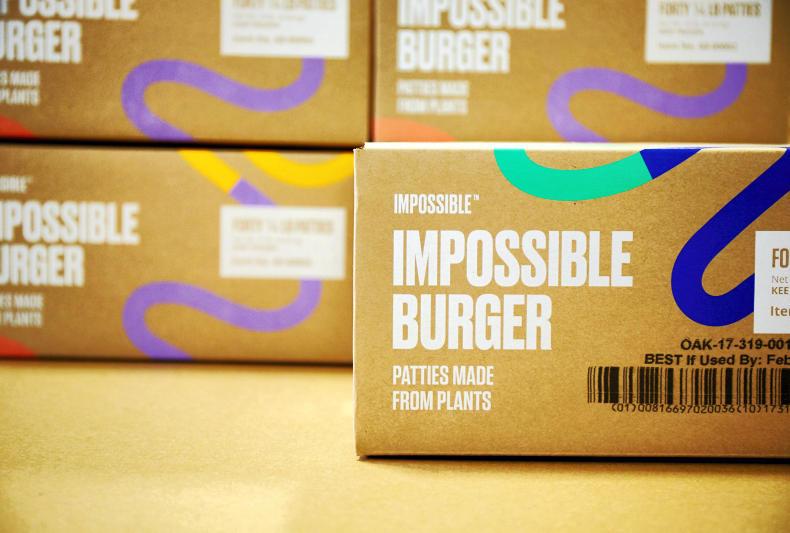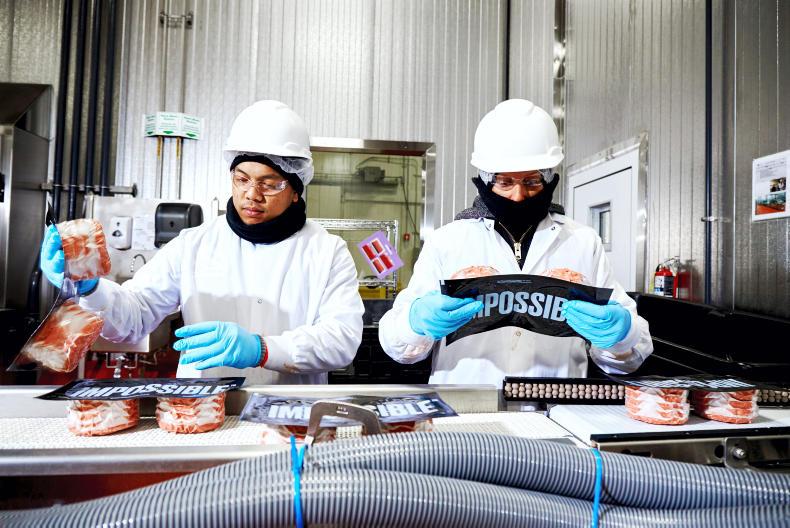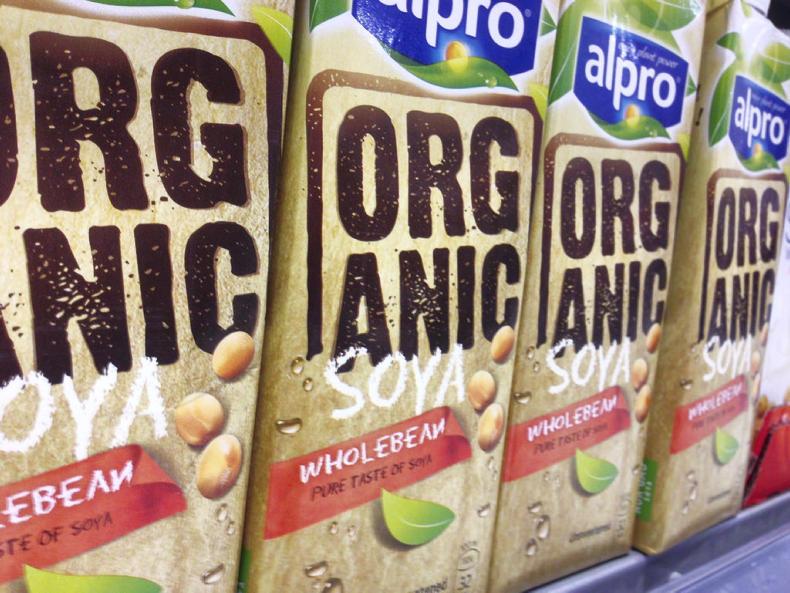When is a meat company not a meat company? The answer, of course, is when it becomes a protein company. In the US, Tyson Foods is the country’s largest meat processor, selling more than $30bn worth of beef, pork and chicken in 2017. However, management at Tyson are increasingly trying to position the business away from its traditional image of a meat processor, describing itself to investors as a “leader in protein”.
In December last year, Tyson’s chief sustainability officer Justin Whitmore told financial markets the company was reinforcing its focus on protein with its latest investment. It just so happened this latest investment was to increase its stake above 5% in Beyond Meat, a company that makes imitation burgers from plant proteins and whose other investors include Bill Gates and Leonardo DiCaprio.

Impossible Foods, California.
To make these investments, Tyson has a specialised $150m investment arm known as Tyson Ventures. As well as Beyond Meat, Tyson Ventures has also invested in Memphis Meats, a startup company based in San Francisco that grows cultured meat such as beef, chicken, pork and duck from petri dishes in a lab.
The emergence of the alternative protein movement in the US, which has spread to Europe, is a threat that Ireland’s food industry needs to monitor
Tyson is not the only established food giant to make such a move into the alternative protein sector. In July 2016, French dairy giant Danone announced it had agreed a $12.5bn (€10bn) deal to acquire WhiteWave Foods, a Colorado-based manufacturer of branded health foods.

Almond and soya milk.
The company is best known for its Alpro brand, under which it sells protein products such as almond, soya or coconut dairy alternatives. Danone described the deal as a perfect match that created a global company “aligned” with consumer trends.
The WhiteWave acquisition was the largest deal in over a decade for Danone and instantly doubled the size of its business in the US market. It also made Danone the world’s largest producer of organic foods and plant-based nutrition products.
An acquisition price of $56.25 per share, or almost 25 times earnings (EBITDA), meant that acquiring WhiteWave was not cheap for Danone. However, financial markets didn’t seem to mind the hefty price tag, with shares in Danone rising strongly in the hours after the announcement.
Consumer trends
In WhiteWave and Beyond Meat, Danone and Tyson have bought into businesses, albeit at very different stages of establishment, that are playing at the very heart of the latest consumer health trends. In other words, both companies are buying into growth.
Putting aside growth targets and profits margins, what does Danone and Tyson’s leap into the alternative protein business signal for the traditional protein industries of meat and dairy? The respective investments indicate that both companies are taking seriously the consumer backlash against traditional protein sources. In 2016, retail sales of alternative meat products and substitutes in the US increased more than 15% to reach $700m (€575m). This market is forecast to rise another 25% over the coming years to reach close to $865m (€705m) by 2021.

Impossible Foods makes meat and cheese products from plants.
Beyond Meat burgers will sell in more than 5,000 US stores this year, including retail giants such as Whole Foods and Kroger. Another notable startup in this area is Impossible Foods, a company that makes meat and cheese products from plants. Impossible Foods has raised almost $400m in investor capital since it was founded in 2011.
Playing into the emerging trend of alternative meat demand, fast-food giant McDonald’s launched a vegan-friendly soya-based burger late last year called the McVegan.
Dairy disruption
In the dairy aisle, the disruption caused by plant-based alternatives has been even more pronounced. Traditional dairy finds itself competing for shelf space in the same fridges as soya, almond, coconut, rice and even oat-based dairy alternatives on an increasing level.
For 2018, the global market for dairy alternatives is set to surpass $16bn (€13bn) – more than double where it was in 2010. Yet demand is such that the global market for dairy alternatives is forecast to double again by 2024 to reach $34bn (€28bn).

Almond and soya milk.
Consumer demand
While the growth in consumer demand for both dairy and meat alternatives is impressive, they remain a fraction of traditional meat and dairy markets. The global market for dairy is estimated at more than $450bn (€370bn) per annum, while the global meat and seafood market was estimated at $720bn (€590bn) last year. For established players such as Danone and Tyson, investing early in the rapidly growing alternative protein sector allows them to hedge against potential disruption further down the line. However, it is important to note that these companies will help to scale up production of alternative proteins in a way we’ve not seen up to now.
Tyson alone is processing almost seven million cattle per year in the US, more than 22 million pigs and over 18 billion chickens. When the company decides it is in a position to help Beyond Meat or Memphis Meats scale up production, the impact could be dramatic.
Likewise, Danone is seeking to blur the lines of distinction between what the terms "dairy" and "plant-based" mean as it further integrates WhiteWave into its core business. The company has repositioned itself as a nutrition and health company and away from its dairy roots.
Threat to Ireland
The emergence of the alternative protein movement in the US, which has spread to Europe, is a threat that Ireland’s food industry needs to monitor. Producing traditional protein from beef, lamb, pork and dairy is the backbone of the country’s food industry.
With Ireland exporting more than 556,000t of beef and over 650,000t of dairy product last year (more than 90% of production for both sectors) to world markets, our primary producers are particularly exposed to changing consumer trends around protein and how it is consumed.
Ireland is the world’s fifth largest net exporter of beef and, following the abolition of dairy quotas, has grown to become the fifth largest dairy exporter of the EU28.
With this in mind, a number of Irish companies have made similar moves to those of Danone and Tyson. In February last year, Glanbia announced it had acquired Amazing Grass, a US-based maker of non-GMO plant-based protein products. At the time of the purchase, Glanbia said Amazing Grass would give it a good footing in the plant-based nutrition market and was “complementary” to its current portfolio of dairy-based brands.
Amazing Grass was established by two tech entrepreneurs in 2002 and manufactures plant-based protein products from cereals and alfalfa aimed at vegan and gluten-free shoppers.
In a similar move earlier this year, Kerry Group acquired Ojah BV, a Dutch company that manufactures substitute meat products from plant proteins such as peas and soya. Kerry is understood to have paid in the region of €20m for the business.
Ojah BV was founded in 2009 and produces over 1,600t of substitute meat products every year, which it markets under its Plenti brand in more than 20 countries.
Kerry Group has long-established brands in the traditional meat sector but its acquisition of Ojah BV highlights the company’s awareness of this new protein sales channel. Prior to the Ojah BV acquisition, Kerry already manufactured a range of dairy-free, soya-free and vegan plant-based protein products under its ProDiem brand.
Kerry has said a number of its customers have asked it to develop menu options around alternative protein products, further indicating the shifting mindset in the food industry about where protein comes from.
The traditional sources of protein are being disrupted by new science-led businesses that are seeking to eke out a share of a rapidly growing market.
When is a meat company not a meat company? The answer, of course, is when it becomes a protein company. In the US, Tyson Foods is the country’s largest meat processor, selling more than $30bn worth of beef, pork and chicken in 2017. However, management at Tyson are increasingly trying to position the business away from its traditional image of a meat processor, describing itself to investors as a “leader in protein”.
In December last year, Tyson’s chief sustainability officer Justin Whitmore told financial markets the company was reinforcing its focus on protein with its latest investment. It just so happened this latest investment was to increase its stake above 5% in Beyond Meat, a company that makes imitation burgers from plant proteins and whose other investors include Bill Gates and Leonardo DiCaprio.

Impossible Foods, California.
To make these investments, Tyson has a specialised $150m investment arm known as Tyson Ventures. As well as Beyond Meat, Tyson Ventures has also invested in Memphis Meats, a startup company based in San Francisco that grows cultured meat such as beef, chicken, pork and duck from petri dishes in a lab.
The emergence of the alternative protein movement in the US, which has spread to Europe, is a threat that Ireland’s food industry needs to monitor
Tyson is not the only established food giant to make such a move into the alternative protein sector. In July 2016, French dairy giant Danone announced it had agreed a $12.5bn (€10bn) deal to acquire WhiteWave Foods, a Colorado-based manufacturer of branded health foods.

Almond and soya milk.
The company is best known for its Alpro brand, under which it sells protein products such as almond, soya or coconut dairy alternatives. Danone described the deal as a perfect match that created a global company “aligned” with consumer trends.
The WhiteWave acquisition was the largest deal in over a decade for Danone and instantly doubled the size of its business in the US market. It also made Danone the world’s largest producer of organic foods and plant-based nutrition products.
An acquisition price of $56.25 per share, or almost 25 times earnings (EBITDA), meant that acquiring WhiteWave was not cheap for Danone. However, financial markets didn’t seem to mind the hefty price tag, with shares in Danone rising strongly in the hours after the announcement.
Consumer trends
In WhiteWave and Beyond Meat, Danone and Tyson have bought into businesses, albeit at very different stages of establishment, that are playing at the very heart of the latest consumer health trends. In other words, both companies are buying into growth.
Putting aside growth targets and profits margins, what does Danone and Tyson’s leap into the alternative protein business signal for the traditional protein industries of meat and dairy? The respective investments indicate that both companies are taking seriously the consumer backlash against traditional protein sources. In 2016, retail sales of alternative meat products and substitutes in the US increased more than 15% to reach $700m (€575m). This market is forecast to rise another 25% over the coming years to reach close to $865m (€705m) by 2021.

Impossible Foods makes meat and cheese products from plants.
Beyond Meat burgers will sell in more than 5,000 US stores this year, including retail giants such as Whole Foods and Kroger. Another notable startup in this area is Impossible Foods, a company that makes meat and cheese products from plants. Impossible Foods has raised almost $400m in investor capital since it was founded in 2011.
Playing into the emerging trend of alternative meat demand, fast-food giant McDonald’s launched a vegan-friendly soya-based burger late last year called the McVegan.
Dairy disruption
In the dairy aisle, the disruption caused by plant-based alternatives has been even more pronounced. Traditional dairy finds itself competing for shelf space in the same fridges as soya, almond, coconut, rice and even oat-based dairy alternatives on an increasing level.
For 2018, the global market for dairy alternatives is set to surpass $16bn (€13bn) – more than double where it was in 2010. Yet demand is such that the global market for dairy alternatives is forecast to double again by 2024 to reach $34bn (€28bn).

Almond and soya milk.
Consumer demand
While the growth in consumer demand for both dairy and meat alternatives is impressive, they remain a fraction of traditional meat and dairy markets. The global market for dairy is estimated at more than $450bn (€370bn) per annum, while the global meat and seafood market was estimated at $720bn (€590bn) last year. For established players such as Danone and Tyson, investing early in the rapidly growing alternative protein sector allows them to hedge against potential disruption further down the line. However, it is important to note that these companies will help to scale up production of alternative proteins in a way we’ve not seen up to now.
Tyson alone is processing almost seven million cattle per year in the US, more than 22 million pigs and over 18 billion chickens. When the company decides it is in a position to help Beyond Meat or Memphis Meats scale up production, the impact could be dramatic.
Likewise, Danone is seeking to blur the lines of distinction between what the terms "dairy" and "plant-based" mean as it further integrates WhiteWave into its core business. The company has repositioned itself as a nutrition and health company and away from its dairy roots.
Threat to Ireland
The emergence of the alternative protein movement in the US, which has spread to Europe, is a threat that Ireland’s food industry needs to monitor. Producing traditional protein from beef, lamb, pork and dairy is the backbone of the country’s food industry.
With Ireland exporting more than 556,000t of beef and over 650,000t of dairy product last year (more than 90% of production for both sectors) to world markets, our primary producers are particularly exposed to changing consumer trends around protein and how it is consumed.
Ireland is the world’s fifth largest net exporter of beef and, following the abolition of dairy quotas, has grown to become the fifth largest dairy exporter of the EU28.
With this in mind, a number of Irish companies have made similar moves to those of Danone and Tyson. In February last year, Glanbia announced it had acquired Amazing Grass, a US-based maker of non-GMO plant-based protein products. At the time of the purchase, Glanbia said Amazing Grass would give it a good footing in the plant-based nutrition market and was “complementary” to its current portfolio of dairy-based brands.
Amazing Grass was established by two tech entrepreneurs in 2002 and manufactures plant-based protein products from cereals and alfalfa aimed at vegan and gluten-free shoppers.
In a similar move earlier this year, Kerry Group acquired Ojah BV, a Dutch company that manufactures substitute meat products from plant proteins such as peas and soya. Kerry is understood to have paid in the region of €20m for the business.
Ojah BV was founded in 2009 and produces over 1,600t of substitute meat products every year, which it markets under its Plenti brand in more than 20 countries.
Kerry Group has long-established brands in the traditional meat sector but its acquisition of Ojah BV highlights the company’s awareness of this new protein sales channel. Prior to the Ojah BV acquisition, Kerry already manufactured a range of dairy-free, soya-free and vegan plant-based protein products under its ProDiem brand.
Kerry has said a number of its customers have asked it to develop menu options around alternative protein products, further indicating the shifting mindset in the food industry about where protein comes from.
The traditional sources of protein are being disrupted by new science-led businesses that are seeking to eke out a share of a rapidly growing market.



















SHARING OPTIONS